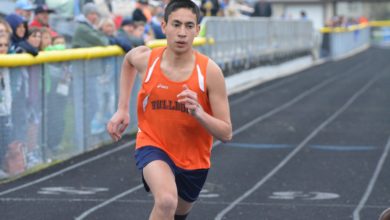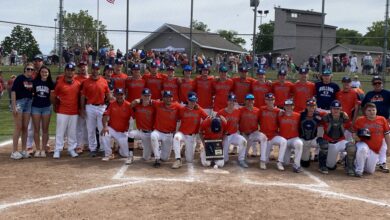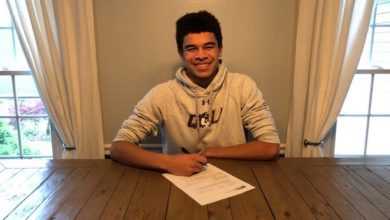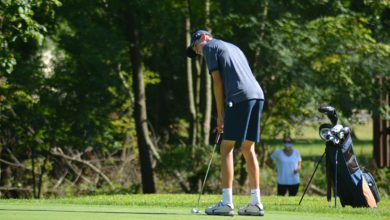Bosch and Risley weigh in on IHSA basketball decision

By FRED KRONER
High school basketball in Illinois doesn’t have a green light, full-speed-ahead option, but there was more optimism in the state on Wednesday than there was on Tuesday.
A second consecutive day of surprises greeted coaches, players, parents, school administrators and fans on Wednesday (Oct. 28).
One day after Illinois governor J.B. Pritzker switched basketball from a low-risk to a high-risk sport as COVID-19 cases statewide continue to grow – which essentially meant that games or even intrasquad scrimmages could not be contested – the Illinois High School Association said on Wednesday it will defy the state edict.
Instead, the IHSA will follow the guidance of the IHSA Sport Medicine Advisory Committee and permit high school basketball teams to start practicing on Nov. 16 – as had been previously announced – with games set to begin for both boys’ and girls’ teams the week of Nov. 30.
Before any celebrations could take place, however, Pritzker followed up with an ominous announcement, saying, “We’ve told school districts what the rules are, and I think they all know. So, IHSA may have their own views of it, but school districts know what the rules are and I think that, it’s unfortunate, but they would be probably taking on legal liability if they went ahead and moved beyond what the state has set as the mitigation standard.”
Whether high school basketball becomes a reality sooner – or later – remains to be determined. Area administrators and coaches are in agreement that the IHSA decision is a step in the right direction.
“We’re excited about the IHSA decision,” Mahomet-Seymour principal – and former boys’ basketball coach – Chad Benedict said. “It gives us an opportunity.
“It forces some conversations and things to think about as far as how it pertains to our kids.”
If basketball takes place on the timetable that is currently listed – and that is a big if – certain criteria must be met.
Everyone involved in the games – players, coaches and referees – will be mandated to wear masks even during the competition.
The IHSA will implement a mandatory timeout at the middle of each quarter, executive director Craig Anderson said so players and officials can “catch their breath.”
Additionally, not more than 50 persons will be allowed in the gymnasium. That total will include not only the players, coaches and referees, but also the trainers, scorekeepers and other personnel at the official table.
If teams each had 14-player rosters, one manager and three coaches apiece, that would total 36 people. Add on three game officials, one scorebook keeper per school, one person shooting video of the game for each school, a scoreboard operator, a trainer, a bus driver from the out-of-town school and a supervisory home school administrator, that would leave room for – at most – three spectators.
Anderson said he expects the Board of Directors to review spectator options in November.
Anderson acknowledged that it wasn’t easy to buck state officials.
“It is a big deal to say to the governor or officials at the department of public health that we are going a different direction than what you are advising,” Anderson said.
The limited number of spectators in the stands also lessens the likelihood that college coaches will be in attendance. Anderson said though they may not “come and watch, at least film will be created and they can play and have statistics.”
Not to be overlooked is the fact that there would be no space for a junior varsity team, according to the current protocol.
It’s not an ideal situation, but coaches wouldn’t balk.
“In regards to fans, we’d obviously love to have them there for numerous reasons,” M-S girls’ basketball coach Garret Risley said, “but in a year of sacrifice, we’ll have to come to terms with the fact that we’d rather have a game without fans than no games at all.”
Mahomet-Seymour boys’ basketball coach Ryan Bosch said he has attempted to remain positive.
“I think we’ve always had a cautiously optimistic approach,” Bosch said. “Hope for the best. Prepare for the worst.
“I think we’ve tried to take this seriously and attack this process with a game-plan like we would anything else.
“We’ve done that with the hope – maybe not quite expectation – that we’d have a season.”
Bosch said the past months have not been easy for him.
“I’ve personally found this an extremely hard process to go through and endure,” he said. “This whole process has been surreal and I am continually reminded of why I got into education and coaching in the first place; because the kids give me as much inspiration as I can hope to give them.”
Anderson said he and the Board of Directors were encouraged to move forward with basketball based on feedback they had received the past two months.
“We’ve been conducting fall contact days, within guidelines of the IDPH (Illinois Department of Public Health) and didn’t have any indication that things went poorly,” Anderson said.
Additionally, various Board members had heard from residents in their respective districts.
“In the areas they represent, they had heard from schools that this (no-play policy for many traditional fall sports) is hurting kids,” Anderson said. “We need to do something that is student-centered and, in their opinion, we can do it safely.”
Anderson is confident that safety won’t be sacrificed for the sake of having a competitive season.
“With players in masks, and limiting the gatherings, while we don’t have the testing (of colleges and professional teams), the self-monitoring lends itself to us conducting basketball safely,” Anderson said.
If approval is ultimately gained for basketball to be played during its traditional winter season, individual school districts will have the option to opt out as will individual families who might not want to take the risk.
Before that point is reached, however, school districts will likely need to see where they stand legally as well as what their insurance carriers say as far as liability.
Bosch said he is amazed at how well his squad members have dealt with the ups and downs associated with the coronavirus pandemic.
“I told our kids (Wednesday), when we tried to walk them through all that had transpired, that I was in awe of how they’ve conducted themselves through all of this,” Bosch said.
“I told them that I was inspired at how well they’ve adapted, shown resiliency and been able to persevere through enough adversity to break many adults. It’s a testament to the type of kids we’ve got in our community.”
Risley echoed the same sentiments.
“On a positive note, in a time of uncertainty where there has been an opportunity to regress or slack due to the uncertainty of what the future holds, it’s been inspiring to see the efforts from each of the girls on a daily basis,” Risley said. “I know the Mahomet community would be proud of them, as I feel they do a nice job of representing the culture we try to foster here.”
In one respect, a potential basketball season would resemble the structure of fall sports that were allowed to participate.
“I don’t anticipate it culminating with state championships in many of our winter sports,” Anderson said.
In the fall, golf and cross-country conducted regional and sectional events. Tennis and swimming had one postseason competition, a sectional.
Another issue that will eventually need to be addressed – if basketball resumes – is the cost factor.
Gate receipts help defray some of the expenses, such as for the game officials and the costs associated with busing teams out of town.
Without spectators, the revenue will be missing for districts which have already set their budgets.
Bosch acknowledges that he likes the chances for basketball to take place as he reflected at mid-week better than he did earlier in the week.
“It has been a roller-coaster of emotions,” Bosch said. “I don’t have a sense of whether or not we’ll be playing yet.
“That’ll have to be decided as a district, but I appreciate the idea that we’ve got a chance.”
The IHSA is expected to release its full guidelines for basketball and all winter sports (including boys’ swimming, competitive cheerleading and competitive dance) on Thursday (Oct. 29).
In a separate – but expected – announcement, the IHSA on Wednesday officially moved high school wrestling from the winter to its newly created summer season.
Wrestling can start practicing on April 19 for a season that will conclude on June 26.





